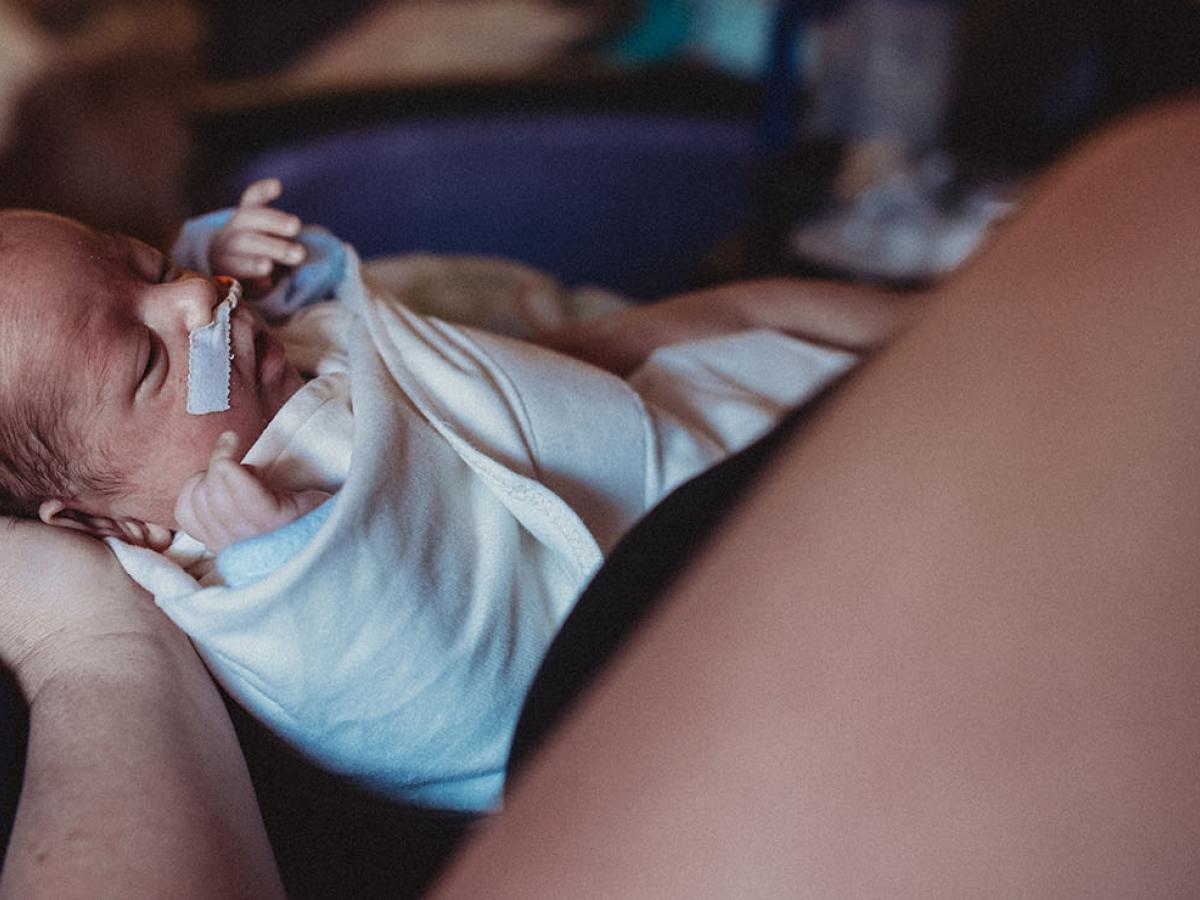April 25, 2024

Most moms feel guilty about things like losing patience with their children or taking a night for themselves. But mothers who experience a difficult pregnancy or have a newborn in the neonatal intensive care unit (NICU) often feel guilty on a deeper level. They may blame themselves for what their baby has gone or will go through.

Whether you have mom guilt as an expecting or new parent — or know someone experiencing a difficult pregnancy or birth — understanding and managing these feelings is critical. When left unchecked, mom guilt can be damaging both mentally and physically.
To shed some light on the emotional impact of complicated pregnancies and births, we turned to a panel of MU Health Care experts who help people manage unexpected news at every stage of pregnancy and early parenthood:
- Dasi Schlup, a licensed clinical social worker who supports women with high-risk pregnancies and families with children in the NICU
- Lauren Vollrath, a nurse practitioner who works with women who have high-risk pregnancies
- Dr. Sarah Younger, a neonatologist who cares for infants in the NICU

They shared seven things moms experiencing difficult pregnancies or births — and their loved ones — need to know about mom guilt.
1. It’s Normal to Wonder Why This Is Happening
Every mom with a difficult pregnancy or child in the NICU tries to understand what happened. “Moms feel they should be the ones to protect their child and keep them safe and healthy,” Dr. Younger says. “But when that doesn’t turn out how they wanted it to, it naturally lends itself to thoughts of, ‘What did I do wrong? What could I have done differently?’”
The truth, adds Dr. Younger, is that nothing you did could have changed the outcome. This didn’t happen because you missed your prenatal vitamin, had too much Diet Coke or drank alcohol before you knew you were pregnant. “We don’t always know why these things happen,” she says. “About 99% of the time, the complications happen because of bad luck, genetics or some combination of the two.”
2. Mom Guilt Takes Many Forms

Learning that your pregnancy, birth or newborn may not be as you pictured can be challenging to process. The hardest part for many is realizing that they are powerless over what is happening.
Moms who feel guilty are grasping for control and answers. They can experience a range of emotions, including:
- Anger at a physician or their partner
- Anxiety about the health of the fetus or newborn
- Depression and feelings of deep sadness
“Guilt is rarely an isolated emotion,” Schlup says. “You may find yourself crying, yelling at people, constantly asking providers for more information or all the above.”
3. Prenatal and Postpartum Guilt Can Be Isolating
When pregnancy or childbirth doesn’t go as expected, it can be hard to connect with those around you. Your friends and family may not know what to say or do. You may feel like no one truly understands what you’re experiencing. You might think others are judging or blaming you. Many moms in these situations feel helpless, depressed and alone.
Prioritizing mental health is important for every pregnant or new mom, but it’s critical if you are feeling isolated or depressed. “Many people go off all their meds because they are pregnant or plan to breastfeed, but that’s not always the right option,” Vollrath says. “Your mental health does not have to take a toll because of pregnancy and childbirth — there are safe medication options and other things we can do to help you.”
4. Grieving Is a Natural Part of NICU Mom Guilt
Grieving is the process of coping with loss, and it doesn’t always involve the loss of a person. If you had a difficult pregnancy or birth, you may be sad about not having the healthy baby you expected or the experience you anticipated. And those feelings are OK.
"Many parents grieve when they have a premature baby,” Dr. Younger says, “and not just because the baby needs extra care. They grieve not getting to lounge in a bed feeding their newborn or bringing the baby home with them when they left the hospital. It’s natural to feel anger, frustration, sadness or any combination of those feelings when it comes to that loss. It doesn’t take anything away from how much you love your child.”
5. Mom Guilt Can Impact Your Physical Health
Typically, you can take it easy after having a baby. But complications that have you pumping breastmilk around the clock and trekking in and out of the hospital to be with your baby can take a toll on your health. Add feelings of guilt, depression or anxiety to the mix, and the stress can affect your diet and sleep habits.
“We know there’s a connection between your body and brain,” Dr. Younger says. “When your brain is not at its best, your body’s ability to heal will be affected, too. Your thoughts may be so anchored to your sick child that you forget that your body just went through something big, and you need to take care of your own health.”
6. Self-Care Isn’t Selfish
Guilt and the need to parent through it can call for self-care as a much-needed coping mechanism. Taking time for yourself can actually benefit both you and your baby, Schlup says.
Self-care looks different for everyone, so it’s important to reflect on which activities feel good to you. Maybe:
- Getting a massage
- Getting your nails or hair done
- Going for a walk outside
- Having lunch with a friend
- Journaling or reading
- Spending quality time with your other children
- Taking a nap
“It’s good to leave the NICU occasionally and find a brief, distracting activity that can alleviate some of the overwhelming stress you’re experiencing,” Schlup says. “Babies don’t have object permanence until they’re 6 months old, so it’s good for them to have you there, but they don’t feel left alone when you’re gone.”
7. Support Is Available at Every Stage of Pregnancy and New Motherhood
Any complication during pregnancy or childbirth can make you feel guilty. But help is always available.
Prenatal and postnatal support can include:
- Counseling for moms and couples
- A social work team to assess families’ needs, provide counseling, assist with difficult decision-making and offer appropriate resources
- Perinatal hospice and palliative care to support families when a baby has a life-limiting situation
- OB triage, an area of the emergency department focused on pregnancy concerns and emergencies
- Prenatal meetings, which help families understand what to expect when doctors anticipate birth complications
- Support groups during pregnancy for NICU families or specific to your child’s medical condition
“Pregnancy and childbirth are hard in general, but the goal, whenever possible, is for you to have a meaningful experience and find ways to bond with your baby,” Vollrath says. “We’re here to support you in whatever way you need.”
Next Steps and Useful Resources
- Want to learn more about care for high-risk pregnancies? Learn more about our maternal fetal medicine program.
- Curious about NICU services? Learn more.


